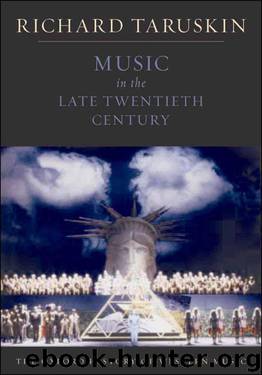Music in the Late Twentieth Century: The Oxford History of Western Music by Taruskin Richard

Author:Taruskin, Richard [Taruskin, Richard]
Language: eng
Format: epub
Publisher: Oxford University Press
Published: 2009-06-24T01:00:00+00:00
CHAPTER 7
The Sixties
CHANGING PATTERNS OF CONSUMPTION AND THE CHALLENGE OF POP
WHAT WERE THEY?
A
s a catchphrase, “the sixties” does not refer precisely to the decade of the 1960s. Coined in nostalgia, in resentment, at any rate in retrospect, the phrase evokes disruption, a period of social division brought on by a confluence of social transformations. First, and in the United States possibly most important, there was a newly militant and newly successful drive for social equality. The movement for the recognition of the civil rights of racial minorities coincided significantly with the phasing out of European colonial rule in Africa and scored an important victory in 1964 with the passage of a comprehensive Civil Rights Act by the United States Congress. There was also a new impetus toward the assertion of equal rights for women in public life, coinciding with the development of new techniques of contraception (the “birth control pill”) that made family planning easier and more subject to women’s control. Women now sought greater control over other aspects of their lives, including the right to compete as equals in the workplace, and the right to control childbirth. Betty Friedan (1921–2006) published The Feminine Mystique, a broad attack on the notion that women could find fulfillment only in childbearing and homemaking, in 1963. The National Organization for Women (NOW), a powerful pressure group with Friedan as its first president, was founded three years later. Women’s rights proved more difficult to secure (on paper, at least) than minority rights. A constitutional amendment guaranteeing them failed repeatedly to win ratification by the states, and the guarantee of legal abortion on demand was only won through the courts in 1973.
Among the other effects of “the pill” was a general loosening of sexual constraints, sometimes called the “sexual revolution,” and, as a corollary, a newly public questioning of the social stigma attached to homosexuality, which culminated in 1969 in a riot at the Stonewall Bar in New York, when a group of patrons forcibly resisted arrest, in a routine police raid, in the name of “gay pride.” Gay rights has been an issue in legal contention, alongside women’s rights and racial or ethnic minority rights, ever since. The challenge to the idea that American society was governed by a “mainstream” consensus (often symbolized by the metaphor of a “melting pot”), or a set of norms to which all its members aspired, was one of the sixties’ signal accomplishments. The “mainstream,” especially when asserted in the realm of culture, came under increasing fire as a metaphor for an unjust status quo, or a covert locus of authoritarian domination and oppression. The pluralism thus ushered in (denounced by its opponents as amoral relativism) had a powerful impact on education and the arts.
Download
This site does not store any files on its server. We only index and link to content provided by other sites. Please contact the content providers to delete copyright contents if any and email us, we'll remove relevant links or contents immediately.
Periodization Training for Sports by Tudor Bompa(8255)
The Body: A Guide for Occupants by Bill Bryson(5082)
The MacArthur Bible Commentary by John MacArthur(4823)
The Sports Rules Book by Human Kinetics(4379)
What It Really Takes to Get Into Ivy League and Other Highly Selective Colleges by Hughes Chuck(3753)
Marijuana Grower's Handbook by Ed Rosenthal(3678)
The Sprouting Book by Ann Wigmore(3587)
The Martian by Andy Weir(3419)
Salt, Fat, Acid, Heat: Mastering the Elements of Good Cooking by Nosrat Samin(3146)
Sapiens and Homo Deus by Yuval Noah Harari(3068)
The Bread Bible by Rose Levy Beranbaum(3066)
Harry Potter 4 - Harry Potter and The Goblet of Fire by J.K.Rowling(3061)
The Marketing Plan Handbook: Develop Big-Picture Marketing Plans for Pennies on the Dollar by Robert W. Bly(3057)
Classic by Mary Berry(3011)
Martha Stewart's Baking Handbook by Martha Stewart(2854)
Screenplay: The Foundations of Screenwriting by Syd Field(2637)
The Plant Paradox by Dr. Steven R. Gundry M.D(2613)
50 Economics Classics by Tom Butler-Bowdon(2568)
The Cambridge Grammar Of The English Language by Rodney Huddleston Geoffrey K. Pullum(2429)
